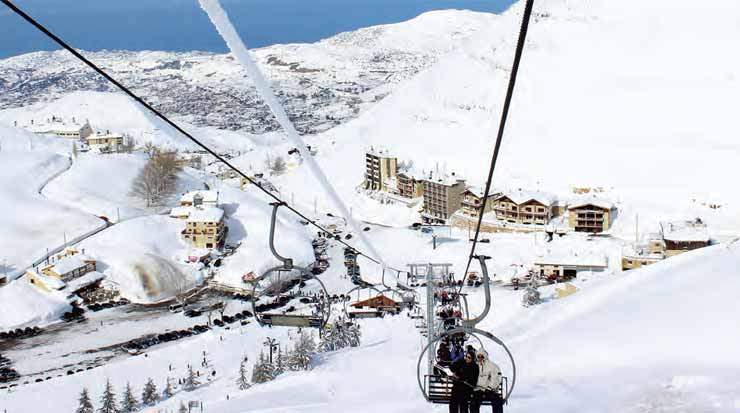Nonetheless, partially due to recent incidents in another regional favourite, Turkey, GCC travellers are also gradually returning and in addition to that, the Lebanese diaspora also represents an ever-important segment, pinpointed Cynthia Flouty, director, sales and marketing, Mövenpick Hotel Beirut.
Underscoring expats’ significance to the wider tourism sector, Shady Younis, sales manager, Advanced Car Rental, said that a larger share of business comes from Lebanese expatriates retuning to their home country from across the globe and especially from the GCC.
Hoteliers are also intensifying their effort to tap into new markets, with Mohamad Zein, director of sales, Four Points by Sheraton Le Verdun, listing Russia and Iran among the top up-and-coming segments.
Confirming his peers’ words, Zein also admitted that the focus has recently been on attaining volume and capturing a larger share of the market by signing direct contracts with head offices and annual deals with corporate clients.
In fact, despite a weaker demand from holiday-makers, business travel is an ever-growing segment in Lebanon, underlined Maha Atieh, director, sales, Phoenicia Hotel and Le Vendôme Beirut Hotel, referring to various prestigious conferences and functions staged in the city.
As she disclosed, for this very reason, besides promoting staycation and family packages to the domestic market, the management lays great emphasis on positioning Phoenicia Hotel as a MICE hotspot.
“MICE business and extended stay are currently the main trends in Lebanon,” asserted Ihab Kanawati, general manager, Staybridge Suites Beirut, revealing that in order to leverage on this demand, the property has recently launched a meeting room for 40 people.
As he revealed, despite the challenges, as an upscale extended stay concept, the hotel continues to witness an increase in corporate bookings month after month.
According to Atieh, many of these long-staying guests are arriving to Lebanon to seek medical treatments with local hospitals and doctors being particularly acclaimed for plastic surgeries, making medical tourism a burgeoning segment for the country.
As Zein pinpointed, being less volatile to local and regional circumstances, these niche areas, such as MICE or medical tourism are highly important especially at times when due to the repercussion of recent incidents, the leisure travelmarket might take time to fully return.
Echoing similar views, Boulad stated, “In my opinion, eco and medical tourism are still largely undervalued and have huge potential.”
As Francois Galoisy, general manager, Radisson Blu Martinez Hotel, Beirut, put it, Lebanon can serve all kinds of tourism.
“We are the number one business and tourist destination, especially during winter for ski lovers and during the summer months for mountain [tours] and nightlife entertainment,” he said, highlighting the past year’s new dimension in the leisure segment; that being ecotourism.
“Many small hotels and houses have been refurbished to host tourists looking for a new experience in Lebanon and to discover new areas and the authentic Lebanese culture that sometimes is [hard to find] in big cities,” added Galoisy.
Although Elie Nammour, marketing director, BELAIR Travel & Tourism, firmly believes that in the long-term MICE and leisure travel are unbreakable and will therefore always flourish, he served with evidence for the growing interest in lesser-known attributes of Lebanon saying that the company’s clients are increasingly inclined to add interesting elements, such as bike tours, ecological adventures, renewable energy trips to solar farms and even cooking and dancing lessons to their itineraries.
As Younis said, “Apart from Lebanon’s perfect climate and topography, its rich history and culture, the Lebanese are known for their genuine hospitality and their developed medical centres.
This gives the country a great potential in every tourism segment.”
While agreeing with his peers that niche offerings, including religious and medical tourism, boast high potential, Grauel called for a united approach to exploit these promising segments.
“These tourism sectors require a special focus and tailor-made strategy within the marketing plans of both the specialists of the hospitality companies combined with the long-term vision and a path-clearing support from Lebanon’s concerned ministers,” said Grauel.
BACK TO NORMAL
Hopes are indeed high.
“Today, Lebanon is looking to the future and welcomes tourists back to its resorts, natural attractions and glittering urban scene,” said Eid Maalouf.
As Boulad noted, with the new head of state taking office, Lebanon is once again regaining the confidence of the regional and international community.
“Huge projects are underway, including oil and gas exploration and improvements in infrastructure, and the Ministry of Tourism is also conducting interesting campaigns,” explained Boulad.
Industry stakeholders and the people of Lebanon in general are indeed used to facing and overcoming challenges, asserted Kanawati, saying that is it now time to spread positive vibes.
Summarising the industry’s outlook for the future, Nammour concluded, “My guess is that 2017 will be an unprecedented year for Lebanon.”









